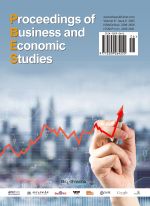Abstract
The digital economy has injected continuous momentum into the development of urban economy and plays a positive and important role in the transformation and upgrading of urban energy consumption. Specifically, the digital economy can significantly improve the efficiency of urban energy consumption by virtue of its distinctive characteristics of low pollution and high efficiency. Moreover, empowered by the digital economy, the pace of transformation and upgrading of high-pollution traditional industries has been accelerated. Particularly importantly, the urban energy consumption structure has been optimized and adjusted through the indirect role of intermediate factors. From this perspective, studying the current situation and countermeasures of urban energy consumption under the digital economy holds important practical significance both in theory and practice. This paper first briefly summarizes the relevant literature on the impact of the digital economy on the energy consumption structure; then, it focuses on detailed data to explore the current situation of urban energy consumption under the digital economy model; finally, based on the summary of the current situation, it puts forward practical and feasible suggestions, hoping to provide a decision-making basis for the implementation of policies in different types of cities and offer innovative ideas for promoting the high-quality development of urban energy systems.
References
Mao F, Hou Y, Gao Y, 2024, The Impact of Digital Economy on the Transformation of Urban Energy Consumption Structure. Zhejiang Academic Journal, 2024(6): 125–136.
Zhu Y, Song Y, 2025, Study on Urban Energy Rebound Effect Considering Digital Economy: Empirical Measurement and Formation Mechanism. Journal of China University of Geosciences (Social Sciences Edition), 25(2): 90–104.
Wu H, Cheng C, 2024, The Impact of Digital Economy Development on Urban Energy Efficiency. Journal of Xinyang Normal University (Philosophical and Social Sciences Edition) 44(5): 53–57.
Zhong C, Zhang Q, Jia J, 2024, Empowerment and Governance of Digital Economy on Low-Carbon Collaboration in Urban Agglomeration Industry. Research on Financial and Economic Issues, 2024(7): 88–101.
Chen C, 2024, Digital Economy, Industrial Co-agglomeration and Urban Carbon Emissions, thesis, Xinyang Normal University.
Liu Y, 2024, Digital Economy and Urban Low-Carbon Development, thesis, Jiangxi University of Finance and Economics.
Tan Z, 2022, How Does Digitalization Level Affect Urban Energy and Environmental Efficiency, thesis, Chongqing University.
Sun C, Song Y, 2025, The Impact of Digital Economy on Urban Carbon Emission Intensity and Its Spatial Effect. Journal of Jianghan University (Social Sciences Edition), 42(2): 92–105.
Liao Z, Ru S, Cheng Y, 2025, Digital Technology Innovation, Energy-Biased Technological Progress and Urban Total Factor Energy Efficiency. Commercial Research, 2024(5): 19–28.
Xu Y, 2024, Study on the Impact of Digital Economy on Urban Green High-Quality Development, thesis, Xinyang Normal University.
Liu Y, 2023, Balancing Production Capacity and Efficiency: Digital Economy Facilitating Urban Low-Carbon Development. Management and Technology of SME, 2023(17): 59–63.
Liao H, 2024, Study on the Impact of Digital Finance on Urban Carbon Emissions, thesis, Shandong Technology and Business University.
Jiao Z, Li W, Liu B, 2024, Will Digital Economy Development Inevitably Reduce Industry Carbon Emissions? Nankai Economic Studies, 2024(6): 110–128.
Zhong Y, 2023, Study on the Spatial Effect of Digital Inclusive Finance on Energy Intensity, thesis, Xi'an University of Science and Technology.
Chen X, Jiang Y, He M, 2024, Study on the Impact of Digital Technology on Jiangsu's Low-Carbon Economy. Journal of Nanjing Institute of Technology (Social Sciences Edition), 24(2): 57–65.
